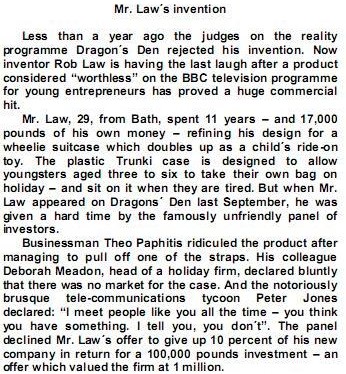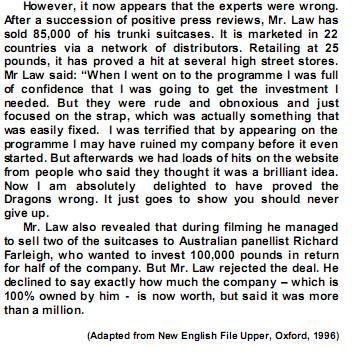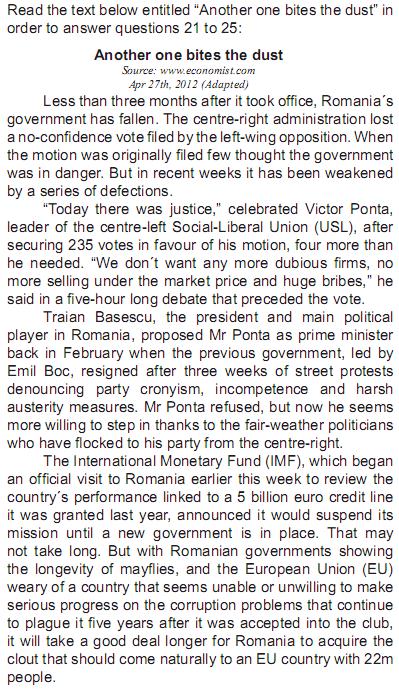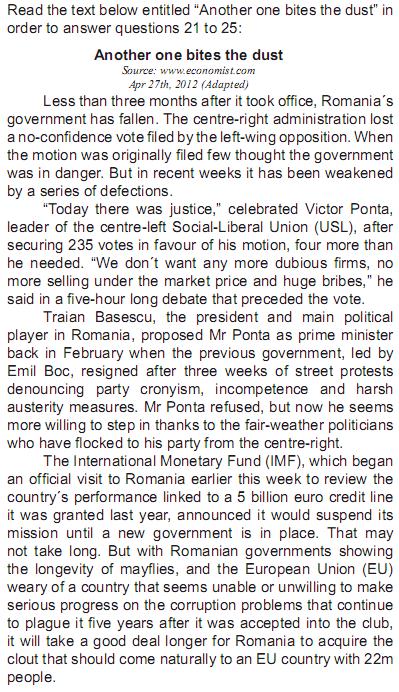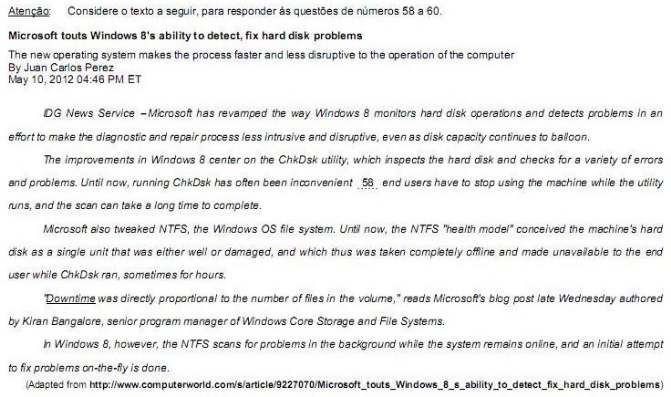Attention: For questions 53-60, read the text below and decide which answer (A, B, C or D) best fits each gap.
Saving energy: it starts at home
We already know the fastest, 53 expensive way to slow climate change: use less energy. With a little effort, and not 54 money, most of us could reduce our energy diets by 25 percent or more − 55 the Earth a favor while also helping our pocketbooks. So what's holding us back? Scientists have reported recently that the world is heating up even faster 56 predicted only a few years 57 , and that the consequences could be severe if we don't 58 reducing emission of carbon dioxide and other greenhouse gases that are trapping heat in our atmosphere. But what can we 59 about it as individuals? Will our efforts really 60 any difference?
(Extracted from the National Geographic Magazine, March 2009)
Attention: Read the text and answer questions 21 to 29.
A Writer's Beginnings in Kenya By ALEXANDRA FULLER
ONE DAY I WILL WRITE ABOUT THIS PLACE
A Memoir By Binyavanga Wainaina 256 pp. Graywolf Press. $24.
Dear reader, I'll save you precious time: skip this review and head directly to the bookstore for Binyavanga Wainaina's stand-upand-cheer coming-of-age memoir, "One Day I Will Write About This Place." [CONNECTIVE] written by an East African and set in East and Southern Africa, Wainaina's book is not just for Afrophiles or lovers of post-colonial literature. This is a book for anyone who still finds the nourishment of a well-written tale preferable to the empty-calorie jolt of a celebrity confessional or Swedish mystery. Not that Wainaina is likely to judge [PRONOUN] taste in books. In fact, at its heart, this is a story about how Wainaina was almost [TO EAT] alive by his addiction to reading anything available. "I am starting to read storybooks," he says of his 11-year-old self, growing up in Nakuru, Kenya. "If words, in English, arranged on the page have the power to control my body in this world, this sound and language can close its folds, like a fan, and I will slide into its world, where things are arranged differently." As he leaves childhood [ADVERB 1] − "My nose sweats a lot these days, and my armpits smell, and I wake [ADVERB 2] a lot at night all wriggly and hot, like Congo rumba music" − Wainaina retreats further from the confusing realities of politics and adolescence and his big multinational family (his father a Kenyan businessman and farm owner, his mother a Ugandan salon owner) and deeper into a world of words. At school he is told, and believes, that he is supposed to become a doctor or a lawyer, an engineer or a scientist. But Wainaina seems constitutionally incapable of absorbing anything that would further a career in these fields. By the time Wainaina leaves Kenya to attend university in South Africa, a country smoldering with the last poisonous fumes of apartheid, his addiction to books is complete. He drops out of school to pursue more completely a life of reading.
Adapted from http://www.nytimes.com/2011/08/14/books/review/one-day-i-will-write-about-this-place-by-binyavanga-wainaina-book-review.html?pagewanted=all)
The missing [CONNECTIVE] is
Attention: Read the text and answer questions 21 to 29.
A Writer's Beginnings in Kenya By ALEXANDRA FULLER
ONE DAY I WILL WRITE ABOUT THIS PLACE
A Memoir By Binyavanga Wainaina 256 pp. Graywolf Press. $24.
Dear reader, I'll save you precious time: skip this review and head directly to the bookstore for Binyavanga Wainaina's stand-upand-cheer coming-of-age memoir, "One Day I Will Write About This Place." [CONNECTIVE] written by an East African and set in East and Southern Africa, Wainaina's book is not just for Afrophiles or lovers of post-colonial literature. This is a book for anyone who still finds the nourishment of a well-written tale preferable to the empty-calorie jolt of a celebrity confessional or Swedish mystery. Not that Wainaina is likely to judge [PRONOUN] taste in books. In fact, at its heart, this is a story about how Wainaina was almost [TO EAT] alive by his addiction to reading anything available. "I am starting to read storybooks," he says of his 11-year-old self, growing up in Nakuru, Kenya. "If words, in English, arranged on the page have the power to control my body in this world, this sound and language can close its folds, like a fan, and I will slide into its world, where things are arranged differently." As he leaves childhood [ADVERB 1] − "My nose sweats a lot these days, and my armpits smell, and I wake [ADVERB 2] a lot at night all wriggly and hot, like Congo rumba music" − Wainaina retreats further from the confusing realities of politics and adolescence and his big multinational family (his father a Kenyan businessman and farm owner, his mother a Ugandan salon owner) and deeper into a world of words. At school he is told, and believes, that he is supposed to become a doctor or a lawyer, an engineer or a scientist. But Wainaina seems constitutionally incapable of absorbing anything that would further a career in these fields. By the time Wainaina leaves Kenya to attend university in South Africa, a country smoldering with the last poisonous fumes of apartheid, his addiction to books is complete. He drops out of school to pursue more completely a life of reading.
Adapted from http://www.nytimes.com/2011/08/14/books/review/one-day-i-will-write-about-this-place-by-binyavanga-wainaina-book-review.html?pagewanted=all)
The correct form of [TO EAT] in the above text is
Attention: Read the text and answer questions 21 to 29.
A Writer's Beginnings in Kenya By ALEXANDRA FULLER
ONE DAY I WILL WRITE ABOUT THIS PLACE
A Memoir By Binyavanga Wainaina 256 pp. Graywolf Press. $24.
Dear reader, I'll save you precious time: skip this review and head directly to the bookstore for Binyavanga Wainaina's stand-upand-cheer coming-of-age memoir, "One Day I Will Write About This Place." [CONNECTIVE] written by an East African and set in East and Southern Africa, Wainaina's book is not just for Afrophiles or lovers of post-colonial literature. This is a book for anyone who still finds the nourishment of a well-written tale preferable to the empty-calorie jolt of a celebrity confessional or Swedish mystery. Not that Wainaina is likely to judge [PRONOUN] taste in books. In fact, at its heart, this is a story about how Wainaina was almost [TO EAT] alive by his addiction to reading anything available. "I am starting to read storybooks," he says of his 11-year-old self, growing up in Nakuru, Kenya. "If words, in English, arranged on the page have the power to control my body in this world, this sound and language can close its folds, like a fan, and I will slide into its world, where things are arranged differently." As he leaves childhood [ADVERB 1] − "My nose sweats a lot these days, and my armpits smell, and I wake [ADVERB 2] a lot at night all wriggly and hot, like Congo rumba music" − Wainaina retreats further from the confusing realities of politics and adolescence and his big multinational family (his father a Kenyan businessman and farm owner, his mother a Ugandan salon owner) and deeper into a world of words. At school he is told, and believes, that he is supposed to become a doctor or a lawyer, an engineer or a scientist. But Wainaina seems constitutionally incapable of absorbing anything that would further a career in these fields. By the time Wainaina leaves Kenya to attend university in South Africa, a country smoldering with the last poisonous fumes of apartheid, his addiction to books is complete. He drops out of school to pursue more completely a life of reading.
Adapted from http://www.nytimes.com/2011/08/14/books/review/one-day-i-will-write-about-this-place-by-binyavanga-wainaina-book-review.html?pagewanted=all)
De acordo com o texto,
Attention: For questions 41-43, complete the dialogue with one of the options provided below: James: KK 41 to South Africa? Kate: Yes, I have. I KK 42 there about five years ago. James: Oh, really? What KK 43 it like? Kate: One of the most beautiful countries I’ve ever seen
Attention: For questions 41-43, complete the dialogue with one of the options provided below: James: KK 41 to South Africa? Kate: Yes, I have. I KK 42 there about five years ago. James: Oh, really? What KK 43 it like? Kate: One of the most beautiful countries I’ve ever seen
I was wondering if there is anything she would like to KK to me and if she’s happy with the path I've KK in my life.
Attention: For questions 53-60, read the text below and decide which answer (A, B, C or D) best fits each gap.
Saving energy: it starts at home We already know the fastest, 53 expensive way to slow climate change: use less energy. With a little effort, and not 54
money, most of us could reduce our energy diets by 25 percent or more − 55 the Earth a favor while also helping our pocketbooks.
So what's holding us back? Scientists have reported recently that the world is heating up even faster KK 56 predicted only a few years KK 57 , and that the
consequences could be severe if we don't KK 58 reducing emission of carbon dioxide and other greenhouse gases that are trapping heat in our atmosphere. But what can we KK 59 about it as individuals? Will our efforts really KK
60 any difference?
(Extracted from the National Geographic Magazine, March 2009)
Attention: For questions 53-60, read the text below and decide which answer (A, B, C or D) best fits each gap. Saving energy: it starts at home We already know the fastest, 53 expensive way to slow climate change: use less energy. With a little effort, and not 54 money, most of us could reduce our energy diets by 25 percent or more − 55 the Earth a favor while also helping our pocketbooks. So what’s holding us back? Scientists have reported recently that the world is heating up even faster KK 56 predicted only a few years KK 57 , and that the consequences could be severe if we don’t KK 58 reducing emission of carbon dioxide and other greenhouse gases that are trapping heat in our atmosphere. But what can we KK 59 about it as individuals? Will our efforts really KK 60 any difference? (Extracted from the National Geographic Magazine, March 2009)
The excerpt that includes a word (modal) in bold that conveys the meaning of obligation is:
In paragraph 4, the European Union is said to be weary as regards Romania´s attitude towards corruption. In other words,
At the opening of paragraph 2, the leader of the centre-left USL, Victor Ponta, expressed his

Based on the text above, judge the following items.
The sentence You should have different passwords for all of your accounts (L.13-14) expresses an advice to the reader.

